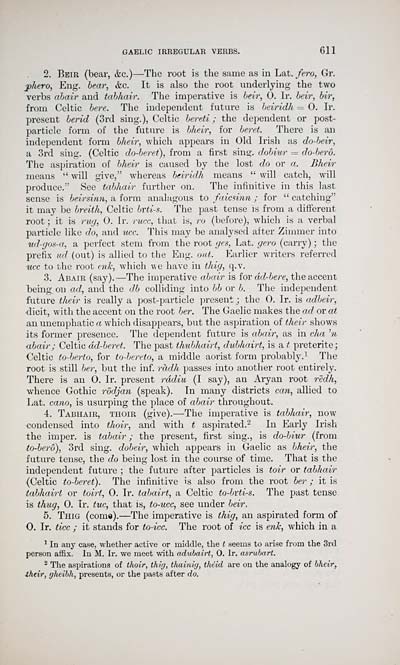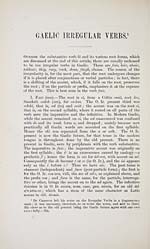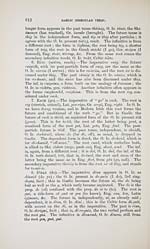Download files
Complete book:
Individual page:
Thumbnail gallery: Grid view | List view

GAELIC IRREGULAR VERBS. 611
2. Beir (bear, (fee.) — The root is the same as in Lat. /ero, Gr.
phero, Eiig. hear, àc. It is also the root underlying the two
verbs ahair and tahhair. The imperative is heir, 0. Ir. heir, bir,
from Celtic 6ere. The independent future is heiridh = 0. Ir.
present herid (3rd sing.), Celtic hereti ; the dependent or post-
particle form of the future is hheir, for heret. There is an
independent form hheir, which appears in Old Irish as do-heir,
a 3rd sing. (Celtic do-heret), fi'om a first sing, dohiur = do-hero.
Tlie aspiration of hheir is caused by the lost do or a. Bheir
means " will give," whereas heiridh means " will catch, will
produce." See tahhair further on. The infinitive in this last
sense is heirsinn, a form analagous to faicnnn ; for " catching"
it may be hreith, Celtic hrti-s. The past tense is from a diflerent
root ; it is rug, 0. Ir. /-ucc, that is, ro (before), which is a verbal
pai-ticle like do, and ucc. This may be analysed after Zimmer into
ud-gos-a, a perfect stem from the root ges, Lat. gero (carry) ; the
prefix ud (out) is allied to the Eng. out. Earlier writers referred
ucc to the root tnk, which we have in thig, q.v.
3. Abair (say). — The imperative cd)air is ior dd-here, the accent
being on ad, ancl the dh colliding into hh or h. The independent
future their is really a post-particle ])resent ; the 0. Ir. is adbeir,
dicit, with the accent on the root her. The Gaelic makes the ad or at
an uuemphatic a which disappears, but the aspiration of their shows
its former presence. The dependent future is ahair, as in cha 'n
abair; Celtic dd-heret. The past thuhhairt, duhhairt, is a t preterite;
C!eltic to-herto, for to-hereto, a middle aorist form probably.^ The
root is still her, but the inf. ràdh passes into another root entirely.
There is an 0. Ir. present rddiu (I say), an Aryan root redh,
whence Gothic rodjan (speak). In many districts can, allied to
Lat. cano, is usurping the place of cdxiir throughout.
4. Tahhair, thoir (give). — The imperative is tahhair, now
condensed into thoir, and with t aspirated.^ In Early Irish
the imper. is tahair ; the present, first sing., is do-hiur (from
to-hero), 3rd sing, doheir, which appears in Gaelic as hheir, the
future tense, the do being lost in the course of time. That is the
independent future ; the future after particles is toir or tahhair
(Celtic to-heret). The infinitive is also from the root her ; it is
tahhairt or toirt, 0. Ir. tahairt, a Celtic to-hrti-s. The past tense
is thug, 0. Ir. tuc, that is, to-ucc, see under heir.
5. Thig (come). — The imperative is thig, an aspirated form of
O. Ir. ticc ; it stands for to-icc. The root of ice is enTc, which in a
^ In any case, whether active or middle, the i seems to arise from the 3rd
person afl&x. In M. Ir. we meet with adubairt, 0. Ir. asruhart.
- The aspirations of thoir, thi'j, thaini(j, thèid are on the analogy of hheir,.
their, (jheihh, presents, or the pasts after do.
2. Beir (bear, (fee.) — The root is the same as in Lat. /ero, Gr.
phero, Eiig. hear, àc. It is also the root underlying the two
verbs ahair and tahhair. The imperative is heir, 0. Ir. heir, bir,
from Celtic 6ere. The independent future is heiridh = 0. Ir.
present herid (3rd sing.), Celtic hereti ; the dependent or post-
particle form of the future is hheir, for heret. There is an
independent form hheir, which appears in Old Irish as do-heir,
a 3rd sing. (Celtic do-heret), fi'om a first sing, dohiur = do-hero.
Tlie aspiration of hheir is caused by the lost do or a. Bheir
means " will give," whereas heiridh means " will catch, will
produce." See tahhair further on. The infinitive in this last
sense is heirsinn, a form analagous to faicnnn ; for " catching"
it may be hreith, Celtic hrti-s. The past tense is from a diflerent
root ; it is rug, 0. Ir. /-ucc, that is, ro (before), which is a verbal
pai-ticle like do, and ucc. This may be analysed after Zimmer into
ud-gos-a, a perfect stem from the root ges, Lat. gero (carry) ; the
prefix ud (out) is allied to the Eng. out. Earlier writers referred
ucc to the root tnk, which we have in thig, q.v.
3. Abair (say). — The imperative cd)air is ior dd-here, the accent
being on ad, ancl the dh colliding into hh or h. The independent
future their is really a post-particle ])resent ; the 0. Ir. is adbeir,
dicit, with the accent on the root her. The Gaelic makes the ad or at
an uuemphatic a which disappears, but the aspiration of their shows
its former presence. The dependent future is ahair, as in cha 'n
abair; Celtic dd-heret. The past thuhhairt, duhhairt, is a t preterite;
C!eltic to-herto, for to-hereto, a middle aorist form probably.^ The
root is still her, but the inf. ràdh passes into another root entirely.
There is an 0. Ir. present rddiu (I say), an Aryan root redh,
whence Gothic rodjan (speak). In many districts can, allied to
Lat. cano, is usurping the place of cdxiir throughout.
4. Tahhair, thoir (give). — The imperative is tahhair, now
condensed into thoir, and with t aspirated.^ In Early Irish
the imper. is tahair ; the present, first sing., is do-hiur (from
to-hero), 3rd sing, doheir, which appears in Gaelic as hheir, the
future tense, the do being lost in the course of time. That is the
independent future ; the future after particles is toir or tahhair
(Celtic to-heret). The infinitive is also from the root her ; it is
tahhairt or toirt, 0. Ir. tahairt, a Celtic to-hrti-s. The past tense
is thug, 0. Ir. tuc, that is, to-ucc, see under heir.
5. Thig (come). — The imperative is thig, an aspirated form of
O. Ir. ticc ; it stands for to-icc. The root of ice is enTc, which in a
^ In any case, whether active or middle, the i seems to arise from the 3rd
person afl&x. In M. Ir. we meet with adubairt, 0. Ir. asruhart.
- The aspirations of thoir, thi'j, thaini(j, thèid are on the analogy of hheir,.
their, (jheihh, presents, or the pasts after do.
Set display mode to: Large image | Transcription
Images and transcriptions on this page, including medium image downloads, may be used under the Creative Commons Attribution 4.0 International Licence unless otherwise stated. ![]()
| Early Gaelic Book Collections > Matheson Collection > Reliquiae Celticae > Poetry, history and philology > (627) |
|---|
| Permanent URL | https://digital.nls.uk/76519405 |
|---|
| Shelfmark | Mat.86 |
|---|---|
| Attribution and copyright: |
|
| Description | Items from a collection of 170 volumes relating to Gaelic matters. Mainly philological works in the Celtic and some non-Celtic languages. Some books extensively annotated by Angus Matheson, the first Professor of Celtic at Glasgow University. |
|---|
| Description | Selected items from five 'Special and Named Printed Collections'. Includes books in Gaelic and other Celtic languages, works about the Gaels, their languages, literature, culture and history. |
|---|

